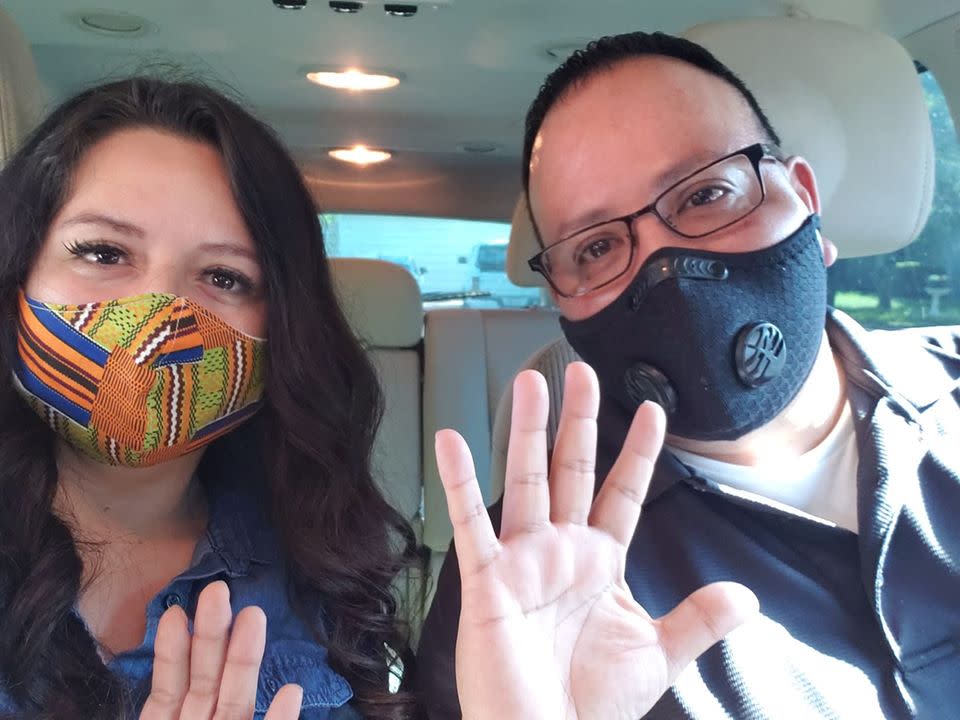This Texas couple set up a Spanish-language errand-running service to help keep the Latinx community safe

A Texas couple is doing their part to help Spanish speakers stay safe during the coronavirus pandemic.
When Diana Azaldua and Jason Rubio saw the devastating effects COVID-19 was having on Austin’s Latinx community, the duo took action. This month, they created a Facebook group called Ayuda, which means “help” in Spanish, to assist the vulnerable population. It serves as both an errand service and a source of employment, allowing Spanish speakers to request services and earn money during the pandemic.
“The group serves two functions,” Anzaldua tells Yahoo Life. “Having the service [helps] people stay home with contactless delivery, and the other function would be to help people make extra money [while] unemployed or suffering financial difficulties during COVID-19.”
“It’s basically meant to replace something like Favor or Instacart, where you can go on and get someone to get your food or prescription or whatever it is you need,” adds Rubio. “When we did some research, we realized it does’t exist in the Spanish language world.”
Last month, the Centers for Disease Control and Prevention released data suggesting that the country’s Latinx population is suffering a disproportionate number of coronavirus cases, surpassing percentages of other minority groups testing positive, Good Morning America reported. In Austin, the Latinx population has been particularly hard hit by the pandemic, says Rubio. “They are the worst affected,” he said, pointing out that while Latinx individuals represent about 34 percent of the population in the area, they make up over 60 percent of those infected and hospitalized.
“This population isn't able to stay home. They don’t have jobs that work from home. They don’t have the luxury for that. If they do have to leave, they don’t have transportation, and they put themselves at risk,” says Rubio. “We're trying to minimize that impact as much as we can. A lot of the Latino population has multigenerational households. Everyone’s affected, and we can see that.”
At the moment, the need for assistance is extreme. Rubio points out that virus rates are going up in Texas.
“It’s still increasing,” he says. “It’s getting worse, and we’re at our highest peak right now as far as alarming rates. We may go on another lockdown because of it.”
With the need so dire, the couple knew that creating an app could take months to get started. Determining that “the need is now,” they decided to take it to Facebook.
“We took some polls with people and asked around, and we realized that people in the Spanish-speaking community are on Facebook more than any other social media. This is a reputable place to put a group where they can have access to this information,” says Rubio. “That’s why we decided to reach them where they are.”

Anzaldua, a therapist, and Rubio, a teacher, saw their creation of the group as an extension of their day jobs. But the couple isn’t taking any profits from Ayuda.
“I think we see that our clients or people we work with are also impacted in this group. The clients that we serve are Hispanic, so we decided we really need to figure out how to help this community,” says Anzaldua.
Anzaldua and Rubio are also doing their best to spread Ayuda’s mission to other cities.
“The cool thing is that this story has gone sort of viral in a way, and people have been reaching out from other cities who want to start their own chapter,” says Rubio. “We're working on making more city pages now, we’re going to be admins on it, and we’re gonna try to hand that over.”
For the latest coronavirus news and updates, follow along at https://news.yahoo.com/coronavirus. According to experts, people over 60 and those who are immunocompromised continue to be the most at risk. If you have questions, please reference the CDC’s and WHO’s resource guides.
How to maintain your physical and mental health during the pandemic
Taking care of a loved one with COVID-19? Here’s how to stay healthy
Q&A with Dr. Kavita Patel: How to keep your family safe and maintain your mental health
Read more from Yahoo Life
Want daily lifestyle and wellness news delivered to your inbox? Sign up here for Yahoo Life’s newsletter.


